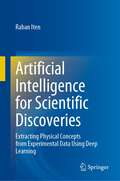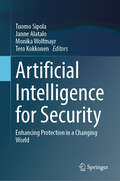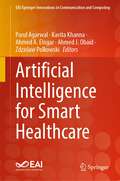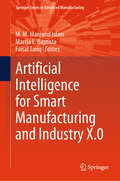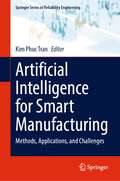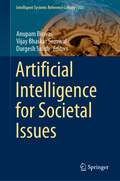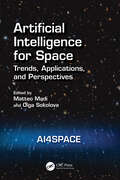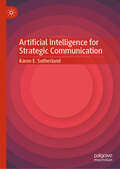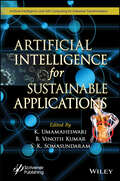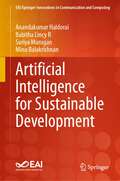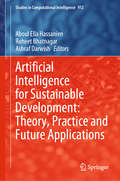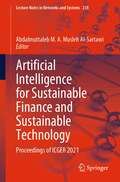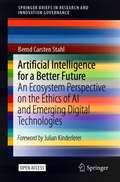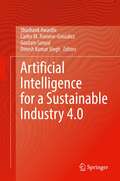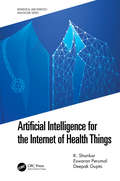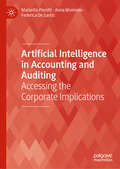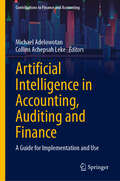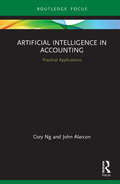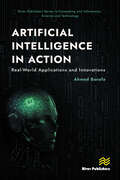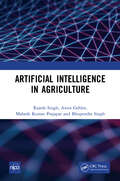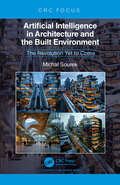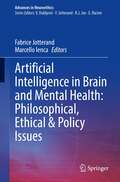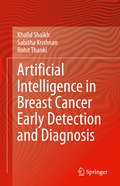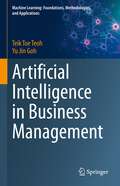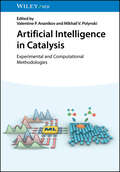- Table View
- List View
Artificial Intelligence for Scientific Discoveries: Extracting Physical Concepts from Experimental Data Using Deep Learning
by Raban ItenWill research soon be done by artificial intelligence, thereby making human researchers superfluous? This book explains modern approaches to discovering physical concepts with machine learning and elucidates their strengths and limitations. The automation of the creation of experimental setups and physical models, as well as model testing are discussed. The focus of the book is the automation of an important step of the model creation, namely finding a minimal number of natural parameters that contain sufficient information to make predictions about the considered system. The basic idea of this approach is to employ a deep learning architecture, SciNet, to model a simplified version of a physicist's reasoning process. SciNet finds the relevant physical parameters, like the mass of a particle, from experimental data and makes predictions based on the parameters found. The author demonstrates how to extract conceptual information from such parameters, e.g., Copernicus' conclusion that the solar system is heliocentric.
Artificial Intelligence for Security: Enhancing Protection in a Changing World
by Tuomo Sipola Tero Kokkonen Janne Alatalo Monika WolfmayrThis book discusses the use of artificial intelligence (AI) for security purposes. It is divided into three parts: methodological fundamentals of AI, use of AI for critical infrastructure protection and anomaly detection. The first section describes the latest knowledge for creating safe AIs and using them to enhance protection. This book also presents various domains and examples of AI-driven security. The chapters describe potential methods, demonstrate use cases and discuss the challenges of the evolving field. This includes topics such as defensive use of AI to detect threats. It discusses the offensive use of AI to better understand the future threat landscape, the use of AI for automation in critical infrastructure and overall challenges of AI usage for critical tasks. As new threats emerge, the use of AI technologies to protect the world one lives in is topical. New technologies in this space have advanced rapidly, and subsequently, their use in enhancing protection is an evident development. To this effect, this book brings together a group of international researchers and professionals who present their views on how to create security through AI. This book targets postgraduate students, researchers and professionals who want to understand the use of AI for security. Understanding latest advancements in this field will also be useful to those who want to comprehend modern cybersecurity in detail and who want to follow research and latest trends.
Artificial Intelligence for Smart Healthcare (EAI/Springer Innovations in Communication and Computing)
by Zdzislaw Polkowski Ahmed A. Elngar Ahmed J. Obaid Parul Agarwal Kavita KhannaThis book provides information on interdependencies of medicine and telecommunications engineering and how the two must rely on each other to effectively function in this era. The book discusses new techniques for medical service improvisation such as clear-cut views on medical technologies. The authors provide chapters on communication essentiality in healthcare, processing of medical amenities using medical images, the importance of data and information technology in medicine, and machine learning and artificial intelligence in healthcare. Authors include researchers, academics, and professionals in the field.
Artificial Intelligence for Smart Manufacturing and Industry X.0 (Springer Series in Advanced Manufacturing)
by Faisal Tariq M. M. Manjurul Islam Marcia L. BaptistaThis book offers a foundational understanding of smart manufacturing (SM) and introduces effective AI methods tailored for smart manufacturing, including supervised, unsupervised, and reinforcement learning techniques. It also features real-world industrial case studies that demonstrate the practical applications of smart manufacturing. Drawing from the invaluable experiences gleaned from the aviation, healthcare, and semiconductors industries, this book provides an in-depth understanding of how AI is driving transformative changes in the manufacturing landscape. In the era of rapid technological advancements, the integration of AI into manufacturing processes has emerged as a game-changer. This book serves as an indispensable guide for navigating this transformation, presenting readers with a multidimensional perspective on the diverse applications, challenges, and opportunities that AI brings to the manufacturing sector. The book explores the emergence of Large Language Models (LLMs) as a valuable tool in manufacturing. It presents how LLMs, especially the GPT series, can process and generate textual data, offering potential applications in areas like smart manufacturing and big-data analysis. It contains detailed case studies, illustrating the practical implementation of smart manufacturing in different industries. The aviation, healthcare, automotive, and semiconductors sectors are examined, highlighting tangible benefits, challenges faced, and lessons learned from each domain. The book addresses the future prospects of Industry 4.0 and beyond—the interconnected, data-driven evolution of manufacturing. It examines the potential impact of emerging technologies such as the Industrial Internet of Things (IIoT), 5G, and advanced robotics on the manufacturing landscape. Challenges and future possibilities pertaining to research and advancement in smart manufacturing within the domains of Aviation, Semiconductors, and Healthcare sectors are also discussed. The chapters will be written in a tutorial style to allow early-career researchers and industry practitioners an in-depth understanding of the various topics. The book serves as a reference for researchers, engineers, and students seeking to understand the synergy between AI, Industry 4.0, LLMs, and real-world applications.
Artificial Intelligence for Smart Manufacturing: Methods, Applications, and Challenges (Springer Series in Reliability Engineering)
by Kim Phuc TranThis book provides readers with a comprehensive overview of the latest developments in the field of smart manufacturing, exploring theoretical research, technological advancements, and practical applications of AI approaches. With Industry 4.0 paving the way for intelligent systems and innovative technologies to enhance productivity and quality, the transition to Industry 5.0 has introduced a new concept known as augmented intelligence (AuI), combining artificial intelligence (AI) with human intelligence (HI).As the demand for smart manufacturing continues to grow, this book serves as a valuable resource for professionals and practitioners looking to stay up-to-date with the latest advancements in Industry 5.0. Covering a range of important topics such as product design, predictive maintenance, quality control, digital twin, wearable technology, quantum, and machine learning, the book also features insightful case studies that demonstrate the practical application of these tools in real-world scenarios.Overall, this book provides a comprehensive and up-to-date account of the latest advancements in smart manufacturing, offering readers a valuable resource for navigating the challenges and opportunities presented by Industry 5.0.
Artificial Intelligence for Societal Issues (Intelligent Systems Reference Library #231)
by Vijay Bhaskar Semwal Anupam Biswas Durgesh SinghArtificial intelligence (AI) has the potential to provide innovative solutions to various societal issues and real-world social challenges. AI is useful in combating some of the seemingly unsolvable social crises facing the world today. Be it disaster awareness and management or demand forecasting, or healthcare informatics or disease outbreaks like COVID-19, the AI plays a pivotal role everywhere. AI has the potential to address some of the societal issues that indirectly pose challenges like cybercrime, agriculture, education, economy, and health. The book covers several applications of AI as solutions to different societal issues, which include economic empowerment, smart education system, COVID-19 detection & management, emotion detection, fraudulent transactions, applications in agriculture and health informatics, etc. The book will be helpful for the academicians and researchers working with various areas of societal issues, data science, artificial intelligence, and machine learning.
Artificial Intelligence for Space: Trends, Applications, and Perspectives
by Matteo Madi Olga SokolovaThe new age space value chain is a complex interconnected system with diverse actors, which involves cross-sector and cross-border collaborations. This book helps to enrich the knowledge of Artificial Intelligence (AI) across the value chain in the space-related domains. Advancements of AI and Machine Learning have impactfully supported the space sector transformation as it is shown in the book. "This book embarks on a journey through the fascinating realm of AI in space, exploring its profound implications, emerging trends, and transformative potential." Prof. mult. Dr.med. Dr.rer.nat. Oliver UllrichDirector Innovation Cluster Space and Aviaton (UZH Space Hub), University of Zurich, Switzerland Aimed at space engineers, risk analysts, policy makers, technical experts and non-specialists, this book demonstrates insights into the implementation of AI in the space sector, alongside its limitations and use-case examples. It covers diverse AI-related topics applicable to space technologies or space big data such as AI-based technologies for improving Earth Observation big data, AI for space robotics exploration, AI for astrophysics, AI for emerging in-orbit servicing market, and AI for space tourism safety improvement. Key Features: Provides an interdisciplinary approach, with chapter contributions from expert teams working in the governmental or private space sectors, with valuable contributions from computer scientists and legal experts; Presents insights into AI implementation and how to unlock AI technologies in the field; Up to date with the latest developments and cutting-edge applications Matteo Madi, Ph.D., is an entrepreneur, innovator, business developer and space-tech specialist with many years of experiences in the Swiss and International public and private sectors. He is the founder of Sirin Orbital Systems AG, a Swiss innovative company based in Zurich, focused on the development and commercialization of advanced enabling technologies for the needs of emerging space market and future sustainable space exploration. It also creates innovative solutions for the use of space technologies and satellite-based services for terrestrial applications. Olga Sokolova, Ph.D., is a risk analyst proficient in critical infrastructure risk assessment to natural and technical hazards. She has been engaged in development and analysis of structural risk-management tools towards sustainable future and has a record in raising social awareness of spaceborne risks and opportunities brought to the society by the "New Space" industry developments. Along with Dr. M. Madi, Dr. O. Sokolova is the Co-Editor of the book entitled, "Space Debris Peril: Pathways to Opportunities", published by CRC Press: Taylor and Francis in November 2020 (ISBN 9780367469450).
Artificial Intelligence for Strategic Communication
by Karen E. SutherlandIn an era where AI is revolutionising every aspect of communication, this groundbreaking research monograph provides an essential roadmap for navigating the intersection of artificial intelligence and strategic communication. Drawing on extensive primary research, including interviews with 41 experts and surveys of 400 professionals across three continents and eight countries, this book provides insights from relevant scholars, communication practitioners and AI tool developers. This comprehensive guide combines scholarly rigour with practical application, presenting a data-informed Model for Practice that helps to withstand the constant evolution of AI technology. Each chapter delivers research-informed, actionable tools relating to the multifaceted field of strategic communication including ethical practice, strategy development, content creation, evaluation, and continuous improvement. Bridging the gap between theoretical understanding and practical implementation, AI for Strategic Communication is an invaluable resource for strategic communication scholars, students, and practitioners, essential for advancing careers in the age of AI. This work emerged from the need for a comprehensive source combining scholarly, practitioner and AI developer perspectives on strategic communication from around the globe.
Artificial Intelligence for Sustainable Applications (Artificial Intelligence and Soft Computing for Industrial Transformation)
by B. Vinoth Kumar K. Umamaheswari S. K. SomasundaramARTIFICAL INTELLIGENCE for SUSTAINABLE APPLICATIONS The objective of this book is to leverage the significance of artificial intelligence in achieving sustainable solutions using interdisciplinary research through innovative ideas. With the advent of recent technologies, the demand for Information and Communication Technology (ICT)-based applications such as artificial intelligence (AI), machine learning (ML), Internet of Things (IoT), health care, data analytics, augmented reality/virtual reality, cyber-physical systems, and future generation networks, has increased drastically. In recent years, artificial intelligence has played a more significant role in everyday activities. While AI creates opportunities, it also presents greater challenges in the sustainable development of engineering applications. Therefore, the association between AI and sustainable applications is an essential field of research. Moreover, the applications of sustainable products have come a long way in the past few decades, driven by social and environmental awareness, and abundant modernization in the pertinent field. New research efforts are inevitable in the ongoing design of sustainable applications, which makes the study of communication between them a promising field to explore. This book highlights the recent advances in AI and its allied technologies with a special focus on sustainable applications. It covers theoretical background, a hands-on approach, and real-time use cases with experimental and analytical results. Audience AI researchers as well as engineers in information technology and computer science.
Artificial Intelligence for Sustainable Development (EAI/Springer Innovations in Communication and Computing)
by Anandakumar Haldorai Suriya Murugan Babitha Lincy R Minu BalakrishnanThis book delves into the synergy between AI and sustainability. This comprehensive guide illuminates the latest trends and cutting-edge techniques, offering invaluable insights for researchers, practitioners, and policymakers interested in the cross-section of AI and sustainability. The authors illustrate how AI-driven innovations are revolutionizing environmental conservation, urban planning, healthcare, and more. The book also considers the ethical considerations and governance frameworks crucial to harnessing AI's potential for global benefit. Whether a seasoned expert or a curious newcomer, this book empowers readers to navigate the dynamic landscape of AI and sustainability, paving the way for a more eco-conscious and equitable world.
Artificial Intelligence for Sustainable Development: Theory, Practice and Future Applications (Studies in Computational Intelligence #912)
by Ashraf Darwish Aboul Ella Hassanien Roheet BhatnagarThis book highlights the latest advances in the field of artificial intelligence and related technologies, with a special focus on sustainable development and environmentally friendly artificial intelligence applications. Discussing theory, applications and research, it covers all aspects of artificial intelligence in the context of sustainable development.
Artificial Intelligence for Sustainable Finance and Sustainable Technology: Proceedings of ICGER 2021 (Lecture Notes in Networks and Systems #423)
by Abdalmuttaleb M. A. Musleh Al-SartawiThis book shows latest research on artificial intelligence for sustainable technology. ICGER 2021 was organized by the Accounting, Finance and Banking Department at Ahlia University, Bahrain, and was conducted on the 15th and 16th of September. The strategic partners included the University of Jordan, the Bahrain Economists Society, the Association of Chartered Certified Accountants: ACCA, Al-Barka Banking Group and the International Computer Auditing Education Association: ICAEA . The theme of the ICGER 2021 centered around artificial intelligence for sustainable finance and sustainable technology. Accordingly, the papers presented at the conference provided a holistic view of sustainable finance, sustainability, AI, financial technology, cybersecurity, blockchain, CSR, and governance. This book, unlike ever before, brings together intelligence applications of new technologies and the sustainability requirements in the era of the digital economy, with special attention given to the opportunities, challenges, for education, business growth, and economic progression of nations which will help societies (economists, financial managers, engineers, ICT specialists, digital managers, data managers, policymakers, regulators, researchers, academics, and students) to better understand, use, and control AI applications and financial technologies to develop future strategies and to achieve sustainable development goals.
Artificial Intelligence for a Better Future: An Ecosystem Perspective on the Ethics of AI and Emerging Digital Technologies (SpringerBriefs in Research and Innovation Governance)
by Bernd Carsten StahlThis open access book proposes a novel approach to Artificial Intelligence (AI) ethics. AI offers many advantages: better and faster medical diagnoses, improved business processes and efficiency, and the automation of boring work. But undesirable and ethically problematic consequences are possible too: biases and discrimination, breaches of privacy and security, and societal distortions such as unemployment, economic exploitation and weakened democratic processes. There is even a prospect, ultimately, of super-intelligent machines replacing humans. The key question, then, is: how can we benefit from AI while addressing its ethical problems?This book presents an innovative answer to the question by presenting a different perspective on AI and its ethical consequences. Instead of looking at individual AI techniques, applications or ethical issues, we can understand AI as a system of ecosystems, consisting of numerous interdependent technologies, applications and stakeholders. Developing this idea, the book explores how AI ecosystems can be shaped to foster human flourishing. Drawing on rich empirical insights and detailed conceptual analysis, it suggests practical measures to ensure that AI is used to make the world a better place.
Artificial Intelligence for a Sustainable Industry 4.0
by Dinesh Kumar Singh Carlos M. Travieso-González Goutam Sanyal Shashank AwasthiThis book outlines the recent advancements in the field of artificial intelligence (AI) and addresses how useful it is in achieving truly sustainable solutions. The book also serves as a useful reference literature in developing sustainable engineering solutions to various social and techno-commercial issues of global significance. This book is organized into two sections: section 1 is focused on fundamentals and principles of AI to lay the groundwork for the second section. Section 2 explores the sustainable engineering solutions development using AI, which addresses challenges in various computing techniques and opportunities in engineering design for sustainable development using IoT/AI and smart cities. Applications include waste minimization, re-manufacturing, reuse and recycling technologies using IoT/AI, Industry 4.0, intelligent and smart grid systems, energy conservation using technology, and robotic process automation (RPA). The book is ideal for the engineers, researchers and students interested in how AI can aid in sustainable development applications.
Artificial Intelligence for the Internet of Health Things (Biomedical and Robotics Healthcare)
by Deepak Gupta K. Shankar Eswaran PerumalThis book discusses research in Artificial Intelligence for the Internet of Health Things. It investigates and explores the possible applications of machine learning, deep learning, soft computing, and evolutionary computing techniques in design, implementation, and optimization of challenging healthcare solutions. This book features a wide range of topics such as AI techniques, IoT, cloud, wearables, and secured data transmission. Written for a broad audience, this book will be useful for clinicians, health professionals, engineers, technology developers, IT consultants, researchers, and students interested in the AI-based healthcare applications. Provides a deeper understanding of key AI algorithms and their use and implementation within the wider healthcare sector Explores different disease diagnosis models using machine learning, deep learning, healthcare data analysis, including machine learning, and data mining and soft computing algorithms Discusses detailed IoT, wearables, and cloud-based disease diagnosis model for intelligent systems and healthcare Reviews different applications and challenges across the design, implementation, and management of intelligent systems and healthcare data networks Introduces a new applications and case studies across all areas of AI in healthcare data K. Shankar (Member, IEEE) is a Postdoctoral Fellow of the Department of Computer Applications, Alagappa University, Karaikudi, India. Eswaran Perumal is an Assistant Professor of the Department of Computer Applications, Alagappa University, Karaikudi, India. Dr. Deepak Gupta is an Assistant Professor of the Department Computer Science & Engineering, Maharaja Agrasen Institute of Technology (GGSIPU), Delhi, India.
Artificial Intelligence in Accounting and Auditing: Accessing the Corporate Implications
by Anna Monreale Mariarita Pierotti Federica De SantisThis book investigates the phenomenon of artificial intelligence (AI) in the accounting world. It integrates accounting competencies with specific competencies in AI and other digital technologies and offers an interdisciplinary perspective. First, the authors review and discuss the literature to summarize and systematize extant research on digitalization in accounting. Second, case studies are included to illustrate the potential impact of AI in business contexts in terms of opportunities and challenges. Based on these, the book explores how digitalization is influencing the accounting practice and what the most important avenues are for future research on digitalization in accounting, and will be of interest to researchers, students, and practitioners of financial technology, accounting, and risk management.
Artificial Intelligence in Accounting, Auditing and Finance: A Guide for Implementation and Use (Contributions to Finance and Accounting)
by Collins Achepsah Leke Michael AdelowotanThis book focuses on the use of Artificial Intelligence (AI) for accounting, auditing, and finance. It explores how AI can be leveraged to perform various tasks within these fields and offers real life examples to illustrate its features and facilitate implementation. The book further examines how different AI technologies, such as Machine Learning, Deep Learning, Natural Language Processing, and others, can be used to improve processes and functions in accounting and financial reporting. Furthermore, the authors explain the different subsets of Artificial Intelligence and how they can be used for practical purposes. The book provides a basic guide of these emerging technologies to help practitioners in the field to better understand how they can be implemented in their companies.
Artificial Intelligence in Accounting: Practical Applications (ISSN)
by Cory Ng John AlarconArtificial Intelligence in Accounting: Practical Applications was written with a simple goal: to provide accountants with a foundational understanding of AI and its many business and accounting applications. It is meant to serve as a guide for identifying opportunities to implement AI initiatives to increase productivity and profitability. This book will help you answer questions about what AI is and how it is used in the accounting profession today. Offering practical guidance that you can leverage for your organization, this book provides an overview of essential AI concepts and technologies that accountants should know, such as machine learning, deep learning, and natural language processing. It also describes accounting-specific applications of robotic process automation and text mining. Illustrated with case studies and interviews with representatives from global professional services firms, this concise volume makes a significant contribution to examining the intersection of AI and the accounting profession. This innovative book also explores the challenges and ethical considerations of AI. It will be of great interest to accounting practitioners, researchers, educators, and students.
Artificial Intelligence in Action: Real-World Applications and Innovations (River Publishers Series in Computing and Information Science and Technology)
by Ahmed BanafaThis comprehensive book dives deep into the current landscape of AI, exploring its fundamental principles, development challenges, potential risks, and the cutting-edge breakthroughs that are propelling it forward. Artificial intelligence (AI) is rapidly transforming industries and societies worldwide through groundbreaking innovations and real-world applications. Starting with the core concepts, the book examines the various types of AI systems, generative AI models, and the complexities of machine learning. It delves into the programming languages driving AI development, data pipelines, model creation and deployment processes, while shedding light on issues like AI hallucinations and the intricate path of machine unlearning.The book then showcases the remarkable real-world applications of AI across diverse domains. From preventing job displacement and promoting environmental sustainability, to enhancing disaster response, drone technology, and even nuclear energy innovation, it highlights how AI is tackling complex challenges and driving positive change.The book also explores the double-edged nature of AI, recognizing its tremendous potential while cautioning about the risks of misuse, unintended consequences, and the urgent need for responsible development practices. It examines the intersection of AI and fields like operating system design, warfare, and semiconductor technology, underscoring the wide-ranging implications of this transformative force.As the quest for artificial general intelligence (AGI) and superintelligent AI systems intensifies, the book delves into cutting-edge research, emerging trends, and the pursuit of multimodal, explainable, and causally aware AI systems. It explores the symbiotic relationship between AI and human creativity, the rise of user-friendly "casual AI," and the potential of AI to tackle open-ended tasks.This is an essential guide for understanding the profound impact of AI on our world today and its potential to shape our future. From the frontiers of innovation to the challenges of responsible development, this book offers a comprehensive and insightful exploration of the remarkable real-world applications and innovations driving the AI revolution.
Artificial Intelligence in Agriculture
by Rajesh Singh Anita Gehlot Bhupendra Singh Mahesh Kumar PrajapatThis book is a platform for anyone who wishes to explore Artificial Intelligence in the field of agriculture from scratch or broaden their understanding and its uses. This book offers a practical, hands-on exploration of Artificial Intelligence, machine learning, deep Learning, computer vision and Expert system with proper examples to understand. This book also covers the basics of python with example so that any anyone can easily understand and utilize artificial intelligence in agriculture field. This book is divided into two parts wherein first part talks about the artificial intelligence and its impact in the agriculture with all its branches and their basics. The second part of the book is purely implementation of algorithms and use of different libraries of machine learning, deep learning and computer vision to build useful and sightful projects in real time which can be very useful for you to have better understanding of artificial intelligence. After reading this book, the reader will an understanding of what Artificial Intelligence is, where it is applicable, and what are its different branches, which can be useful in different scenarios. The reader will be familiar with the standard workflow for approaching and solving machine-learning problems, and how to address commonly encountered issues. The reader will be able to use Artificial Intelligence to tackle real-world problems ranging from crop health prediction to field surveillance analytics, classification to recognition of species of plants etc.Note: T&F does not sell or distribute the hardback in India, Pakistan, Nepal, Bhutan, Bangladesh and Sri Lanka. This title is co-published with NIPA.
Artificial Intelligence in Architecture and the Built Environment: The Revolution Yet to Come
by Michal SourekImagine if every architect had an apprentice who could consistently observe and understand their intentions, take over routine tasks and monitor technical, environmental, and economic constraints. This apprentice would continually improve, freeing the architect to concentrate on truly creative work.This book outlines a plan to turn this vision into reality. It evaluates the development of artificial intelligence from its inception to the present, focusing on the last two decades of applying AI in architectural design and planning; the current state of architectural practice is also examined. Integrating architecture, computer science, AI, robotics, economics, law, neurobiology, and philosophy, the vision is built on three key premises: (i) authentic, poetic creativity that transcends parameterization and algorithmizing, (ii) innovative learning strategies and training approaches not yet applied concerning architectural design, and (iii) the convergence of architecture’s inherent spatiality with virtual reality technology and new theories of human thinking and intelligence, poised for implementation in machine learning.
Artificial Intelligence in Brain and Mental Health: Philosophical, Ethical & Policy Issues (Advances in Neuroethics)
by Fabrice Jotterand Marcello IencaThis volume provides an interdisciplinary collection of essays from leaders in various fields addressing the current and future challenges arising from the implementation of AI in brain and mental health. Artificial Intelligence (AI) has the potential to transform health care and improve biomedical research. While the potential of AI in brain and mental health is tremendous, its ethical, regulatory and social impacts have not been assessed in a comprehensive and systemic way. The volume is structured according to three main sections, each of them focusing on different types of AI technologies. Part 1, Big Data and Automated Learning: Scientific and Ethical Considerations, specifically addresses issues arising from the use of AI software, especially machine learning, in the clinical context or for therapeutic applications. Part 2, AI for Digital Mental Health and Assistive Robotics: Philosophical and Regulatory Challenges, examines philosophical, ethical and regulatory issues arising from the use of an array of technologies beyond the clinical context. In the final section of the volume, Part 3 entitled AI in Neuroscience and Neurotechnology: Ethical, Social and Policy Issues, contributions examine some of the implications of AI in neuroscience and neurotechnology and the regulatory gaps or ambiguities that could potentially hamper the responsible development and implementation of AI solutions in brain and mental health. In light of its comprehensiveness and multi-disciplinary character, this book marks an important milestone in the public understanding of the ethics of AI in brain and mental health and provides a useful resource for any future investigation in this crucial and rapidly evolving area of AI application. The book is of interest to a wide audience in neuroethics, robotics, computer science, neuroscience, psychiatry and mental health.
Artificial Intelligence in Breast Cancer Early Detection and Diagnosis
by Rohit Thanki Khalid Shaikh Sabitha KrishnanThis book provides an introduction to next generation smart screening technology for medical image analysis that combines artificial intelligence (AI) techniques with digital screening to develop innovative methods for detecting breast cancer. The authors begin with a discussion of breast cancer, its characteristics and symptoms, and the importance of early screening.They then provide insight on the role of artificial intelligence in global healthcare, screening methods for breast cancer using mammogram, ultrasound, and thermogram images, and the potential benefits of using AI-based systems for clinical screening to more accurately detect, diagnose, and treat breast cancer.Discusses various existing screening methods for breast cancerPresents deep information on artificial intelligence-based screening methods Discusses cancer treatment based on geographical differences and cultural characteristics
Artificial Intelligence in Business Management (Machine Learning: Foundations, Methodologies, and Applications)
by Teik Toe Teoh Yu Jin GohArtificial intelligence (AI) is rapidly gaining significance in the business world. With more and more organizations adopt AI technologies, there is a growing demand for business leaders, managers, and practitioners who can harness AI’s potential to improve operations, increase efficiency, and drive innovation. This book aims to help management professionals exploit the predictive powers of AI and demonstrate to AI practitioners how to apply their expertise in fundamental business operations. It showcases how AI technology innovations can enhance various aspects of business management, such as business strategy, finance, and marketing. Readers interested in AI for business management will find several topics of particular interest, including how AI can improve decision-making in business strategy, streamline operational processes, and enhance customer satisfaction. As AI becomes an increasingly important tool in the business world, this book offers valuable insights into how it can be applied to various industries and business settings. Through this book, readers will gain a better understanding of how AI can be applied to improve business management practices and practical guidance on how to implement AI projects in a business context. This book also provides practical guides on how to implement AI projects in a business context using Python programming. By reading this book, readers will be better equipped to make informed decisions about how to leverage AI for business success.
Artificial Intelligence in Catalysis: Experimental and Computational Methodologies
by Valentine P. Ananikov Mikhail V. PolynskiEnables researchers and professionals to leverage machine learning tools to optimize catalyst design and chemical processes Artificial Intelligence in Catalysis delivers a state-of-the-art overview of artificial intelligence methodologies applied in catalysis. Divided into three parts, it covers the latest advancements and trends for catalyst discovery and characterization, reaction predictions, and process optimization using machine learning, quantum chemistry, and cheminformatics. Written by an international team of experts in the field, with each chapter combining experimental and computational knowledge, Artificial Intelligence in Catalysis includes information on: Artificial intelligence techniques for chemical reaction monitoring and structural analysisApplication of artificial neural networks in the analysis of electron microscopy dataConstruction of training datasets for chemical reactivity prediction through computational meansCatalyst optimization and discovery using machine learning modelsPredicting selectivity in asymmetric catalysis with machine learning Artificial Intelligence in Catalysis is a practical guide for researchers in academia and industry interested in developing new catalysts, improving organic synthesis, and minimizing waste and energy use.
